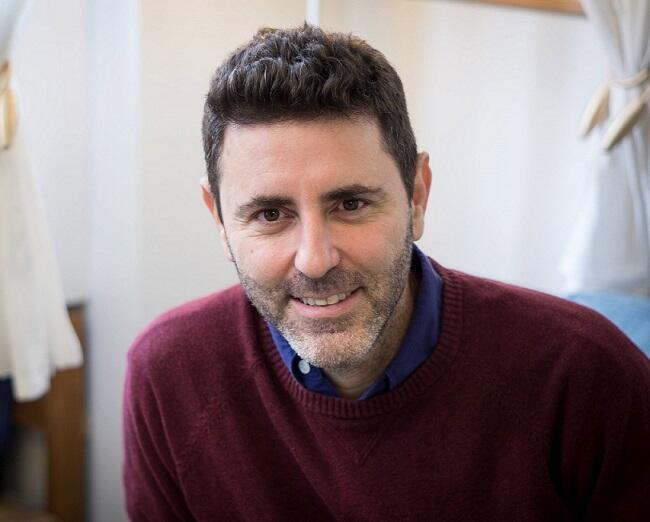Getting your Trinity Audio player ready...
"If there's no dialogue, there is no sex," says couple therapist Roi Tzur, owner of Derech Hakesher, an innovative Israeli psychotherapy institute. In our studio meeting with him, he spoke of the difference between falling in love, which is an exciting and often anxiety-inducing emotion, and just plain love.
"Falling in love and love itself are often viewed in a hierarchy, when falling in love is a more youthful feeling, and love is considered to be more mature," he says. "I disagree. I think it's important to view the relationship between these two terms as parallel, in symmetry."
Roi explains that the falling in love phase can take anywhere from six months to two years. This phase is almost always accompanied with being overcome with Euphoria, in which our partner's flaws are concealed by our will power to form a connection with that person. A veil of ignorance, if you will.
"You know how they say love is blind? It isn't. It's falling in love that's blinding. That phase, however, does end at some point, and then the real work begins."
But that doesn't have to be an arduous experience. According to Roi, you can combine the everyday reality of love with the youthful exuberance of falling in love. "It doesn't mean you live in a fantasy," he says. "You just suspend reality momentarily. It can be something like building a sand castle on the beach, talking about a movie you're seen together and explain to each other how you felt watching it.
"In other words, don't let the day-to-day reality overshadow the reason you noticed each other to begin with. A couple who doesn't know how to play, is unlikely to sustain their connection for a lengthy period of time."
Roi also addressed the issue of the gradual loss of passion as the relationship becomes longer. "The less self-worth we bring into the relationship, the more dependence on the other we will foster. That, in turn, harms the way we view each other."
With couples often fighting, Roi says it's actually an expression of substituted emotion. "Hatred is not the opposite of love," he says. "Indifference is. Hatred can actually be an expression of love, because either way, it's an intense emotion you feel towards your partner. You're very frustrated with them and you project expressions of hatred and aggressiveness to release yourself of that negative feeling and to resume the sensation of love."
Roi speaks of how aggressiveness doesn't have to be projected in a forceful manner. Sometimes, couples are show their aggressive side by not showing anything at all. The fact that they ignore each other speaks volumes. In many ways, the silent approach of aggressiveness can be far more destructive to a relationship than extroverted expressions of anger and resentment.
This can also extend into the more advanced stages of the relationship. When you've been together for many years and the children are all grown up and have left the house, it leaves just the two of you, and the couple that didn't foster the ability to speak to each other up until that point, find themselves confronted with the unwanted reality of living with a person they no longer feel a strong bond with. In that case, fighting is all they have left. It becomes their primary mode of communication.
"With all of that said, giving relationship tips is challenging since they've naturally so complex, but perhaps the most important principle is to nurture self-development and to bring that self-development into the relationship. To be mindful of what it is you contribute.
"While we love talking about the other person, couples therapy is often more talking about yourself. Looking inwards. You need to be strong enough to admit culpability. One might say love is being able to get off your high horse and abandon indignation in order to strengthen a bond you share with the other person."
Roi also speaks about the significance of developing the kind of passion that isn't strictly sexual but mental and emotional, because that kind of passion prominently extends the relationship's shelf life. When there is a strong sense of shared emotion and viewing your relationship through the same prism, it intensifies the sense of intimacy you share.
When asked about porn and how it effects the relationship, Roi says that it depends on whether it comes in addition to frequent intercourse or does it replace it. If it's a playful sort of addition to your sex life, it's not an issue. However, some use it because after a period of time in which the emotional distance between the couple has grown, they don't feel comfortable going to the other person to fulfill their sexual needs, prompting them to turn to porn. That's when it becomes a real problem.
Perhaps the most important relationship-sustaining tip is to avoid letting the occasional sense of emptiness we all share to become a cudgel you use to hit the other side so you won't have to face yourself, which in many ways, is the most difficult confrontation we will ever have.
"It's natural to bring a certain sense of want into a relationship that we hope the other side provides, but don't let it become the focal point of your bond, because it has a corrosive effect. The way to know if you've done to much of it is to observe your partner. Are they busy with pleasing us in a way they haven't before? Are they ignoring us?
"If you sense those changes, the corrosive effect starts taking it toll and you need a course correction."




